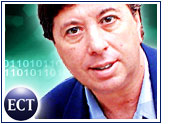
In the world of P2P client software, there are two major contenders to the throne: Kazaa and Morpheus. In contrast to the many lesser-known file-sharing clients, both Kazaa and Morpheus have astonishingly high download numbers. Sharman Networks, which makes the Kazaa P2P application, claims the Kazaa client has been downloaded more than 315 million times. According to Download.com, there have been more than 119 million downloads of Morpheus since April 2001.
At any given time of the day, you will find at least several million users connected and sharing files through the Kazaa and Morpheus clients — an amount of users that runs in stark contrast to the lesser-known P2P clients. But both clients use different strategies: Kazaa is proprietary, while Morpheus mixes proprietary software with some open-source protocols like Gnutella and the ability to connect to other P2P networks, such as Kazaa’s. But whichever client takes top honors in the end, the market — at least for now — seems big enough for both communities of users, and both companies are clearly on the same side in the debate over the legality and legitimacy of distributed file sharing.
In an interview last week, we talked with Phil Morle, the CTO of Sharman Networks, to hear what he had to say about the challenges facing the file-sharing industry and what the future looks like for P2P technology. This week we turn to StreamCast Networks, the other major player in the P2P game, to talk about where P2P technology is heading. In an exclusive interview, Michael Weiss, the CEO of StreamCast Networks, spoke with TechNewsWorld about the future of file sharing.
TechNewsWorld: Please tell us a little about StreamCast and what your role is there.
Michael Weiss: StreamCast Networks is the creator and distributor of the Morpheus P2P file-sharing and searching software. The company originally began its life in 1997 with plans to develop a site to help independent musicians publish, promote and distribute their music. A lot has evolved since then. As chief executive of the company, I provide the vision and direction of the company.
TNW: What would you say the biggest technical challenges are right now in the world of file sharing?
Weiss: “Need More Sources” — three of the most hated words for file searchers. We need to provide a product that gives users efficient search and reliable access to information worldwide, the ability to find everything and to connect to everyone. The goal is to deliver a product with central-server reliability in a decentralized architecture. The user should be able to find what they are looking for if it exists on the network with 100 percent reliability.
Current commercial P2P file-sharing applications flood the networks their users form with search queries that consume way too much bandwidth over the Internet. Unless you are searching for a popular file that is hosted by multiple sources, the chances of finding the file that you want are slim, resulting in a poor user experience. The first company to solve this problem wins.
TNW: How about the most exciting technologies? What’s in store for the P2P community this year?
Weiss: We are working with several computer scientists who graduated from one of the leading Ivy League colleges [and] developed what we believe to be the next generation in P2P technology. They have solved the problem I just described. This technology is called NEOnet, and we will be releasing a beta version of it in the upcoming Morpheus 4.1 version planned later this quarter.
Current P2P technologies are inefficient and incapable of finding all content available on the large distributed networks, resulting in a poor user experience unsuitable for businesses requiring dependable content distribution and delivery. For example, Gnutella’s search query propagation radius — that is, how far a search query will travel the network — is 10,000 nodes and takes a quarter of the client’s bandwidth. Other P2P technologies running on networks as small as 100,000 nodes might make few node look-ups and many minutes to find content, if at all.
However, the NEOnet technology eliminates these inefficiencies through an unprecedented horizon-less search method that can assimilate and find any file, even if it exists on only one node on a network; averaging only 2.8 node look-ups on a network of 10 million concurrent users, keeping the search traffic less than 1 percent.
The end result is a far superior end-user experience that solves the problem that currently plagues ISPs worldwide by reducing by up to 600 percent the amount of Internet traffic caused by P2P search queries. The impact to the consumer is better and more reliable results, and the impact to the enterprise is dramatically reduced infrastructure and content delivery costs.
TNW: Morpheus has licensed the Gnutella protocol. Why not do what Kazaa does instead and rely on your own P2P protocol? Or is there strength in numbers?
Weiss: When I returned to StreamCast earlier this year, Morpheus was already using Gnutella-based code. Gnutella has a strong network of good developers and is based on open-source code that is not controlled by any single company. This will ensure that there will always be clients that connect users through Gnutella. Gnutella has been home to Morpheus for the past two years.
However, there are benefits that you can provide users if you have proprietary technology, such as enhanced security and privacy features that you just can’t provide using open-source technologies. The problem with too many proprietary P2P protocols is that it causes splintering of file-sharing users into separate file-sharing networks. Imagine if there were several different “webs” and you could not connect to certain Web sites unless you had a proprietary Web browser for each group.
We addressed this problem in our just-released Morpheus 4, so instead of users of Morpheus just connecting with other users on the Gnutella network, users of Morpheus 4 can now connect with the users of all the major P2P file-sharing networks. Now, through Morpheus, you can be connected to users of Kazaa, Grokster, eDonkey/Overnet, Gnutella and G2 — over 8 million users at any time of the day. Additionally, we will be introducing the new NEOnet technology in Morpheus 4.1.
TNW: Would you say that Kazaa is your biggest competitor right now? Are there other clients, like LimeWire, that you admire or are partnering with for future developments?
Weiss: I admire each developer of P2P file-sharing technology. Risking the threat of litigation every single day, these brave pioneers continue to innovate and stay true to their convictions. We are proud to be a part of P2P United, a trade group based in Washington, D.C., that is currently comprised of five leading P2P application companies.
Together, we have pooled our resources to ensure that Congress hears all sides of the debate over P2P file-searching and sharing technology and not just what the entertainment conglomerates are telling Congress through their very powerful and influential lobbyists. This is by far the most important partnering we can do for the future of P2P file sharing.
TNW: While the latest Morpheus client declares that it is free of spyware, Morpheus has been criticized for including spyware in the past. And now that the current client includes software that would be better described as adware, has StreamCast been listening to users about the spyware issue? And do you anticipate a time when the client will be adware-free?
Weiss: When I was first running Morpheus from its inception until the later part of 2001, I absolutely refused to bundle third-party software. Users responded by making Morpheus the number one most popular software on the Internet. When I returned to the company earlier this year, I was surprised at the amount and type of third-party software that was being bundled, as well as an absurd number of pop-up ads.
Someplace along the way, the prior management forgot to listen to their customers. I quickly removed all the third-party bundled software that I thought our users might consider to be spyware. Even though there are lots of companies that would gladly pay us to bundle their software with Morpheus, we are very selective on who we partner with.
They must meet our requirements of: 1) beneficial to users; 2) not contain spyware or be able to download additional programs to your computer; and 3) can be easily uninstalled without affecting the Morpheus client or other programs on the user’s computer. The companies we work with right now include My Search and ebates. We will soon be adding another program that delivers free movie trailers and other entertainment to users’ computers. These are programs I use myself and they each meet our requirements.
We expect to offer a premium product that will also be bundle- and ad-free. We are exploring new ways to earn revenues that might be less intrusive to our users and will welcome feedback from the community as we roll out these new initiatives.
TNW: What is your general feeling about the RIAA?
Weiss: I question if the RIAA is serving its members in the most productive manner. I remember a time that mentioning the words “music industry” conjured up visions of some of the great artists from Rock to R&B to Rap. I loved the music industry and was a record label representative when I was in college. Now the very same words bring images of lawyers, lawsuits, subpoenas and indentured artists.
Somehow, the RIAA has taken music’s freewheeling image of rebellion and rock ‘n’ roll and turned it on its head. In their quest to control distribution, pricing and technological innovation, the major record labels and the RIAA have embarked on a journey filled with false accusations and half-truths. In an attempt to portray P2P file sharing as the root of all that is evil with society, the RIAA has resorted to lying to the American public and deceiving Congress.
There are solutions that can be worked out to ensure that artists and copyright holders get paid for their works, such as compulsory licensing. However, the RIAA appears to be more interested in compulsive litigation. For another perspective of the RIAA by a renowned and cutting-edge musician, one might wish to read Todd Rundgren’s editorial that was recently published in the Hollywood Reporter.
TNW: How about personal privacy on P2P networks? Is StreamCast planning any privacy-protection measures like those found in some Kazaa Lite modules?
Weiss: Morpheus currently includes features that help protect a user’s privacy. These user-controlled options include use of public proxy servers and the ability of users to blacklist IP addresses of companies that are known to snoop on users and their downloading habits. Unlike Kazaa, Morpheus does not provide the ability for other users to scan your shared download folder to determine what files you have downloaded to your computer. Future versions of Morpheus will provide users with even greater privacy features that will prevent others from tracking your IP address.
TNW: What do you think the best use of P2P technology is?
Weiss: There are so many great uses for distributed P2P technology, ranging from searching to content distribution to communications. One of the best uses is the enabling of free expression, free from the censorship of oppressive governments and the de facto censorship of news, information and political speech by the consolidation of media and news companies in the control of the entertainment and media conglomerates.
Blogs and Web sites can be shut down and blocked by oppressive regimes, but P2P file sharing cannot. In the end, it will be the marketplace that will determine its best use. Personally, I have been rooting for the P2P participants of SETI@Home to discover proof of extraterrestrial life. That would really move P2P to the forefront of the headlines for something other than lawsuits and pirating music.
TNW: The age of grid computing is upon us. P2P applications like Morpheus have demonstrated the power of distributed computing. What do you see as the role of Morpheus in the future of distributed computing?
Weiss: The challenge for distributed and grid computing applications is not just the technology behind it, but also acquisition, retention and fair-value compensation to users for their resources. Morpheus, being a client application, runs uninterrupted for many hours on users’ computers, offering not only significantly more value and resources toward the distributed processes that are running, but also allowing the users to derive value out of its file-sharing, communications and other user-desired services that run on Morpheus — unlike dormant screensavers like those from SETI@Home. In grid computing, those with the most nodes win, and Morpheus’ user base of millions offers a wealth of resources for grid computing.
TNW: What do you see as the biggest threat to P2P technology?
Weiss: One of the greatest threats to P2P technology is potential legislation that could be passed to control how innovators and developers must design products to conform to the vision of the entertainment and media conglomerates of total control of innovation. They do this to maintain control of their vested interests in distribution of music, films, and other works of authorship and their profit, with little concern for either the consuming public or the true creators of such works.
As I mentioned earlier, Congress is being fed a bunch of lies from a special interest group that represents the very few, albeit extremely powerful multinational conglomerates. It is unfortunate that the majority of America’s heritage — its music and movies — are mostly owned and controlled by foreign-based companies today. Now these same companies are lobbying Congress to destroy the very foundation of America — its ability to create and innovate.
If the entertainment industry had its way, there would have been no player pianos, no FM radio, no television, no video recorders, no video rental stores, no MP3 players and no Morpheus. If history teaches us anything, technological innovation should be embraced not just for the great good it can do today, but for the great promise of what it can bring tomorrow.


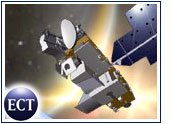

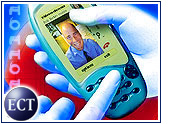
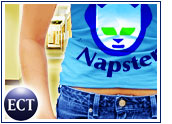

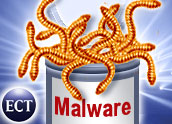














































While everyone fixates on the music file sharing aspect of P2P, they tend to ignore the many, many applications of peer-to-peer technology – such as its roles in scientific research, business, and even in getting new muscial artisits out in front of people. I joined an online community called P2PAct (http://www.p2pact.org). We are dedicated to protecting and promoting P2P technology in its many forms. If you are interested in this powerful technology, please visit our site.
"In the world of P2P client software, there are two major contenders to the throne: Kazaa and Morpheus."
—
I think that is an inaccurate assessment of the file-sharing world. Just because a P2P client has a large number of downloads means absolutely nothing in terms of its popularity or status in the file-sharing world.
—
To think that Morpheus has any kind of edge, or a contender as you put it, over eDonkey2000/Overnet is an injustice. You also fail to realize that many feel that networks such as BitTorrent are far superior to Morpheus in many ways (no third party software, fast speeds, hardly any false or corrupt files, no newbies.) The list goes on.
—
A recent survey by Sandvine put FastTrack’s superiority into serious doubt as it was "discovered" (but already known but many) that the eDonkey2000 network is more popular in Europe than FastTrack. While FastTrack may be the top P2P network in North America, its grand stature in the file-sharing world stops there.
—
It is a habit of the mainstream media to concentrate only on FastTrack, Morpheus and Gnutella; labeling them as "heirs to Napster’s throne" and "the Kings of file-sharing." There are many more people on alternative networks combined than FastTrack or Morpheus can ever hope to have.
—
Your interview wasn’t bad, but it avoided a lot of the questions that should have been asked. You should have asked them about their implementation of FastTrack and eDonkey2000, which has many in the file-sharing world up in arms. If you want, I invite you to check out our inteview with Michael Wiess from a few weeks ago…